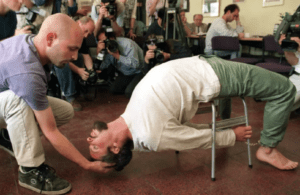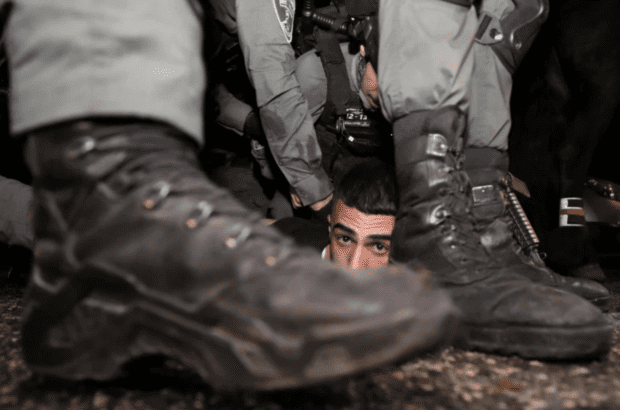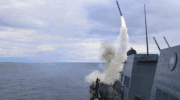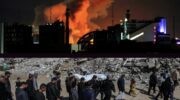Israeli forces detain a Palestinian protester amid protests against the eviction of Palestinian families from their homes in the Sheikh Jarrah neighbourhood of East Jerusalem on May 5, 2021
Multiple sworn affidavits from the past few weeks testify to rampant, systemic Israeli police attacks and brutal beatings of Palestinian citizens of Israel – protesters, minors, innocent bystanders, and even attorneys – inside the city’s police station; floor of ‘torture room’ was covered in blood from violent police beatings.
reposted from Adalah Legal Center for Arab Minority Rights in Israel, June 7, 2021
Lawyers from Adalah – The Legal Center for Arab Minority Rights in Israel have collected multiple sworn affidavits testifying to rampant, systemic Israeli police attacks and brutal beatings of Palestinian protesters, innocent bystanders, children, and even attorneys inside Nazareth’s police station during the period of protests in the city in May.
The graphic testimonies from victims, attorneys, and paramedics on the scene tell a story of systemic Israeli police brutality and physical, verbal, and psychological abuse of Palestinian citizens of Israel in the northern city, and indicate that Israeli officers ran a “torture room” inside the Nazareth police station – an informal term whose initial use may be traced to the recent detainees and lawyers on the scene.
Adalah submitted a formal complaint to senior Israeli officials today, Monday, 7 June 2021, regarding serious failures on the part of Israeli police and investigators in Nazareth that amount to grave criminal offenses, starting on 9 May 2021 and continuing for a number of days.
In their letter, Adalah attorneys Nareman Shehadeh-Zoabi and Wesam Sharaf highlighted brutal, overt Israeli police violence in Nazareth in breach of the rights of Palestinian citizens grabbed off the street and held in the station, including the rights to liberty, dignity and bodily integrity, as well as the right to counsel and due process.
Israeli “police officers led the detainees to a room located on the left side of the entrance corridor to the station, forcing them to sit on the floor handcuffed, to lower their heads towards the floor, and began to beat them on all parts of their bodies, using kicks and clubs, slamming their heads against walls or doors, and more. Officers wounded the detainees, terrorized them, and whomever dared to lift his head upwards risked more beatings by officers. According to affidavits, the floor of the room was covered in blood from the beatings.”
Most of the violent arrests of and attacks on Palestinian citizens of Israel in the city were carried out by Israeli special police forces, including undercover mista’aravim officers posing as Palestinians. Israeli officers would continue beating, shoving, and choking detainees while walking them from the scene of their arrest to the city’s police station.
Additional testimonies indicate Israeli police prevented Palestinian detainees in the Nazareth station from receiving urgent medical care for wounds resulting from beatings and attacks by officers, also another extremely serious criminal offense.
Clear evidence of torture
Almost every night during the Nazareth protests, ambulances were summoned to the police station and wounded Palestinian detainees were evacuated to the city’s hospitals. Other detainees appeared in court following their arrests displaying clearly visible signs of abuse and violence, including stitches on their head, facial swelling, scratches, and extensive bruising.
Sworn testimonies collected from attorneys on the scene indicate Israeli police in Nazareth also attacked them and their colleagues, who were seeking to provide legal aid to Palestinian detainees, used force to distance them from the station, seized telephones and even detained a lawyer.
Adalah demands immediate criminal probe of Israeli police torture
“What happened inside the police station in Nazareth amounts to torture and ill-treatment, and requires the immediate opening of a criminal investigation to examine the circumstances and conditions of the protesters’ detention at the station – including the investigation and prosecution of police officers involved in the violence,” Adalah attorneys wrote in the letter.
Faiz Zbedeiat, 21, university student, Nazareth resident
The protesters stood in a circle … and I stood about 6-7 meters away from them. After a while, a police officer approached the scene and announced over the loudspeaker that the gathering was forbidden and demanded that the participants disperse. When I heard this, I stepped back so that it was clear that I was not part of the rally. I was on the phone with a friend, and a second after I hung up, the cops threw a stun grenade into the street.
Suddenly, I noticed a Border Police officer running towards me, and when he got to me he punched me in the nose. I immediately said: “I’m standing far away [from the protest], what have I done? I didn’t do anything.” He suddenly started yelling at me, cursing me, hitting me again, and he said, “Don’t talk to me, talk to the interrogator.” I immediately said that I was not resisting… Two more policemen arrived, grabbed me and pushed me towards another Border Police officer who grabbed me, hit me, and tried to slam my head against the wall. I asked why they were hitting me when I’m not resisting. I even I put my hands behind my back even though they didn’t handcuff me. Nevertheless, the same Border Police officer hit me in the nose with the walkie-talkie that he was holding. I raised my hands above my head to protect myself, and this angered him and he started cursing and threatening me.
The cops dragged me, grabbing me by the head and forcing me to look down. I was taken to the police station a few minutes’ walk away. On the way to station, the same cops continued beating me even though I wasn’t resisting at all. On the way, we met a policeman who appeared to be an officer, and he started laughing and said to them: “Did you only arrest him? That’s not enough. We need more.”
[In the Nazareth police station], police brought more detainees into the room, some of them minors who were nevertheless held together with us rather than being separated. At this point, the cops started beating us and kicking us with their feet and batons. [My friend] who was next to me, received a blow that caused a head wound which began to bleed. The blood could be seen on the floor. I told him he should ask for immediate medical attention, but he was afraid that if he asked for help they would beat him again.

The cops kept saying “Close the door.” No one was allowed to raise their head; whomever raised his head or spoke was beaten more. I saw one guy who had a broken nose, his face covered in blood, and yet they kept hitting him inside the room. One of the police officers had an M-16 rifle and I saw that he used it to hit detainees. There was a moment when I could take a glance back and see that a police officer who was beating the detainees was masked.
The cops hit us in the back, slapped us in the face. I personally was hit in the back. They tried to hit me in the head but I dodged the blow, so they hit me in the stomach and slapped me in the face. I remained calm and composed the whole the time, but those who resisted or reacted were beaten more. The cops kept trying to provoke us, they cursed and threatened us. For example, during the adhan (Muslim prayer), they started laughing and saying “Pray that God will get you out of here.”
After awhile, a police officer approached me and whispered in my ear, threatening me. He cursed my mother, my sister, and my wife. He then asked, “Did you understand?” I didn’t answer, and he immediately slapped me in the face. He asked me again: “Do you understand?” I still didn’t answer and he slapped me again in the face. Finally, he said “Go explain to your friends”. He pushed me back down to the floor and hit me again.
I saw deliberate humiliation of the detainees. I saw one of the cops kicking a detainee in the leg. Another officer came over and said to him “That’s not how you beat someone,” and kicked the detainee harder. The two cops started laughing.
Omaiyer Lawabne, Nazareth resident
On the eve of Eid el-Fitr and the last day of Ramadan, my brother and I and two other friends decided to go out and celebrate with two friends. We left the house around 21:00, and went to the “Checkers” store near the parking lot on Hagalil Street in Nazareth. I parked the car there, and we went to withdraw money from an ATM. I immediately noticed many police forces in the area, some of whom were well-equipped and looked like special units, as well as a demonstration that was taking place nearby. When I saw this, I started to walk away slowly in order to distance myself a bit.
At one point, I looked to my right and saw a police officer in full gear running towards me with his fist raised in the air. The officer hadn’t appealed to us, hadn’t called out to us, hadn’t demand that we identify ourselves or stop. As soon as he saw us, he came running towards me with his fist raised in the air. But the thing is, we were just standing there, away from the demonstration, in a place where no one was gathering.
When I saw the police officer running towards me, I was scared, and I knew he was going to hit me. Out of fear, I started running. I wanted to stop and explain to him that I hadn’t done anything, but when I looked back I heard someone call out “Throw it, throw it,” and I realized that they were referring to stun grenades.
The cops started throwing grenades at me, and I kept running because I knew that if I stood still I could be badly wounded by the grenades… While I was still running, one of the policemen raised his hand and hit me in the left eye, and I fell to the ground.
I covered my face while begging the cops who surrounded me to release me because I hadn’t done anything. Suddenly, one of the cops started kicking me in the face and head, stepping with his boot on my head and then on my shoulder. Several cops gathered around me as I lay on the ground.
They began to hit me, both kicking and punching. I felt intense pain all over my body, from my head to my legs. One of them started kicking me in the artery behind the ear. At that moment, I thought I was going to die.
After a few minutes, two of the cops dragged me to the city police station. I tried to explain to them that I hadn’t done anything, but when I tried to speak they started punching me in the stomach… I saw that every detainee they brought into the station, they would slam his head against the door. I tried to keep my head away from the door as I didn’t want a scar that would stay with me for life but they still tried to slam my head against the door.
When we entered the station, we continued straight and turned left through a doorway. One of the officers immediately started cursing me and my family, and another slapped my face. There were a lot of detainees in the room, and I was shocked to see that they looked like prisoners of war: They were forced to sit on the floor, with their legs folded under their bodies and their heads held down.
One masked officer was walking around the room with an object in his hand – I couldn’t tell if it was a club or something else – but everyone who raised his head was hit on the head with this object. They pushed me down into a corner and I lowered my head and curled up. Nevertheless, the same police officer hit me hard on the head with that object.
Seconds later I felt a great pain in my head, I saw that there was a large amount of blood coming down from a head wound, and I felt very dizzy… When they saw this, the police dragged me out, and ordered me to put my head under a tap of water. I told them I wouldn’t put my head under the tap because it would aggravate the pain and aggravate the bleeding, that they are also not doctors, and I didn’t need diagnosis by cops but rather professional medical treatment.
One of the cops told me to shut up and hit me on the stomach. I felt threatened so I followed his orders and put just part of my head under the tap, so that it wouldn’t harm the wound. The officer then told me to “put my whole head under the faucet”, held me by the neck, and forced me to put the wound under the faucet.
A few minutes later two paramedics came to me. As soon as they saw me, they immediately decided to take me to the hospital… When the ambulance arrived, the officer who hit me in the head demanded to explain to the paramedics what had happened. I replied that the officer had beaten me with some object, but the officer – in an attempt to cover up my accusation – rejected my explanation and said, “Wrong. You were hit by a rock” [thrown during the demonstration]. I replied that I was not at the demonstration at all, and that police had in fact photographed me at the entrance to the station without any wounds and without bleeding, so it could be seen that I was therefore wounded only after being brought into the station.
That night I was released from hospital directly home rather than back to the police station. I couldn’t sleep for two nights because of the pain and dizziness. I couldn’t eat because of pain from the blows to my stomach. If I tried to eat, I would start vomiting. My chin hurt and I couldn’t speak well. It was the first time I had been arrested, an arrest that I believe was illegal, pointless, and very violent. Since then, I have not been summoned to the police station for any questioning or to provide testimony.
ACTION ALERT: Tell Congress: NO MORE MONEY TO ISRAEL. PERIOD.
ESSENTIAL READING:
- Israeli journalist: ‘I write to remember the brutality of Jewish violence I saw in Jerusalem’
- Mass arrests of Palestinians in Israel’s Operation Law & Order is “a war declaration”
- Torture of Palestinian prisoners: Time to end Israel’s impunity
RELATED READING:
- A Nightmare of Terror Across the Landscape of Palestine
- Untold stories of everyday Israeli brutality
- Israeli soldiers break the silence about midnight invasions of Palestinian homes
- Even with ICC investigation looming, Israel refuses to behave itself
- Rep. Betty McCollum leads effort to block Israel from using US aid to break int’l law
- Special Report: Israel’s treatment of Americans
VIDEOS:





